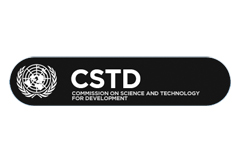Building digital competencies to benefit from existing and emerging technologies with a special focus on gender and youth dimensions
16 May 2018 02:00h
Event report
The panel discussion on Building digital competencies to benefit from existing and emerging technologies with a special focus on gender and youth dimensions took place at the United Nations Office in Geneva (UNOG) during the 21st session of the Commission on Science and Technology for Development (CSTD).
The session was opened by Amb. Geraldine Byrne Nason (Chair, Commission on the Status of Women (CSW)). In her video message, Byrne Nason considered that the CSTD and the CSW share areas of common interest regarding the discussion on women’s rights and technology. Moreover, both the conference and the Commission share credit for creating a co-operative and collaborative discussion around the 2030 Agenda for sustainable development. She explained that the CSW is a space for addressing gender equality and is based on the Beijing platform of action (i.e. the Fourth World Conference on Women held in Beijing in September 1995). She also affirmed that technological innovation is a fundamental driver for integration, thus challenges faced by women need to be urgently addressed. ‘With the fast pace of the technological progress, there is an unprecedented urgence to close the gender gap’, she maintained. Byrne Nason concluded by considering that educating women on information and communications technologies (ICT) skills is crucial in achieving the sustainable development goal (SDG) 5 and more broadly, the 2030 agenda.
Ms Shamika N. Sirimanne (Director, Division on Technology and Logistics, Head of the CSTD Secretariat at UNCTAD) introduced the Report of the Secretary General on building digital competencies. She stressed that new technologies bring both opportunities (e.g. improve living standards) as well as challenges. ‘Development gains are not automatic but depend on the readiness of countries to adopt and adapt to such advancements’, she clarified. She then focused on the existing ‘mismatches’ regarding building digital competencies: by 2020 around 80-90% of jobs in the European Union will require ICT skills and by 2030 around 3-14% of the global workforce will need to switch to new occupational categories. Moreover, there is a considerable gender gap in the access to digital technologies: women are underrepresented in ICT specialised occupations, and in the science, technology, engineering, and mathematics (STEM) fields.
She concluded by illustrating strategies suggested for building digital competencies such as incorporating digital skills in the educational system, creating an enabling environment by investing in digital infrastructure, and promoting collaboration among different stakeholders.
Ms Miriam Nicado García (Rector University of Informatics Sciences (UCI) of the Ministry of Higher Education, Cuba) explained that since 1959, Cuba has progressed in education and science by creating a network of higher education centres comprising over 50 universities nationally. She stated that the UCI was created in 2002 to train professionals dedicated to informatics sciences. Overall, 40% of the students are women and they have the possibility to include a variety of subjects in their studies such as engineering, mathematics, and bioinformatics.
Ms Helena Dalli (Minister of European Affairs and Equality, Malta) considered that in Malta, women are underrepresented in STEM subjects. The gender gap existing in education is also reflected in the job market as women tend to be paid 30% less than men as ICT specialists, and they are represented with a margin of five to one compared to men in the same sector. Moreover, in Malta, men are twice as likely to become engineers than women and they have a five times greater chance to become software developers. She explained that Malta’s national digital strategy strives ‘to make the most out of the technological advancement’, with special attention to gender issues. This is why the government has taken several family-friendly measures aiming at increasing the presence of women in leadership positions in science and technology. She concluded the presentation by considering that ‘stereotyping is the most serious impediment to women moving forward in science’. That is why Malta voted in favour of the establishment of an international day of women and girls in science to be held on 11 February.
Ms Sophia Bekele (Founder & CEO of the DotConnectAfrica Group) first considered that ‘we grow because every day we endeavor to know’. She explained that the current state of the Internet and the latest technological developments ‘have revolutionised Africa’. Despite the fact that Sub-Saharan Africa has the highest number of female startups, there are still existing challenges that women entrepreneurs face while launching a start-up, such as lack of finances, product pricing and poor marketing. She explained that new technologies could significantly help small and medium sized enterprises (SMEs) in, for example, the development of green energy sources. She concluded by explaining that the DotConnectAfrica group aims at fostering the use of Internet of Things (IoT) devices and new technologies in Africa through a partnerships and mentorships programme, as well as complementary gender empowerment initiatives such as Miss.Africa.
Related topics
Related event

Commission on Science and Technology for Development – 21st Session
14 May 2018 10:00h - 18 May 2018 18:00h
Geneva, Switzerland
